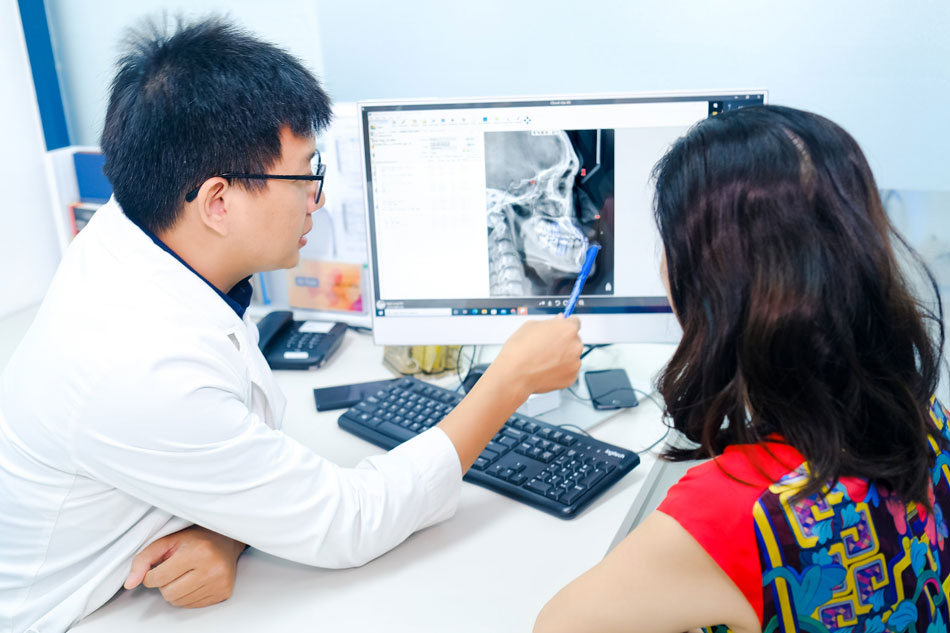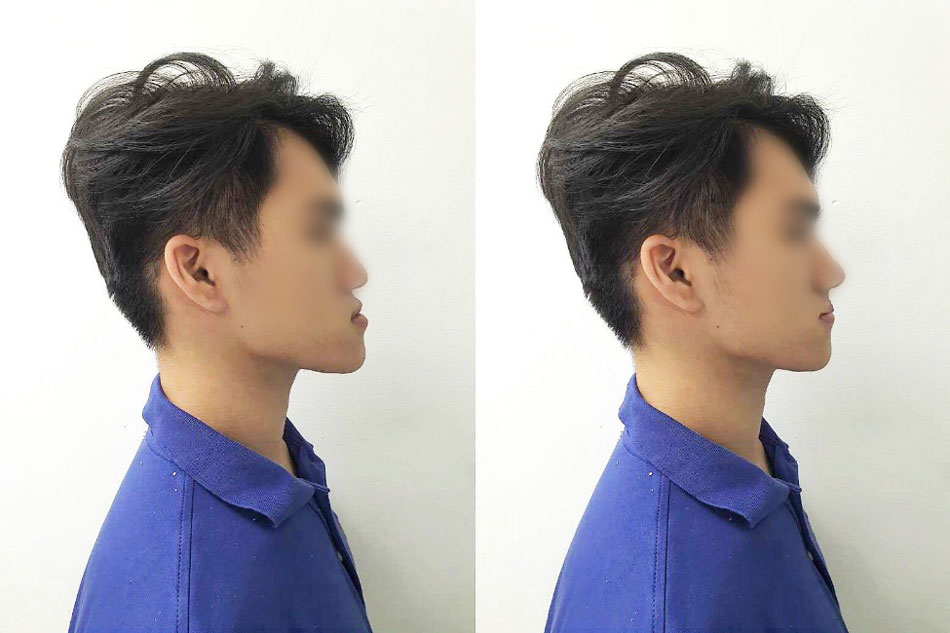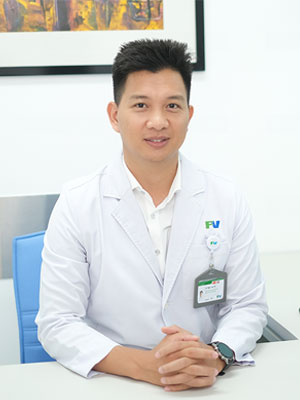After having a failed facial plastic surgery at a beauty salon, Ms L.T.N. came to FV hospital to meet Dr Ngo Long Phi, Oral & Maxillofacial Surgery – Dental Department, in the hope that he could correct the failed surgery.

Dr Long Phi considers Ms L.T.N.’s facial bone anatomy to choose the most suitable solution for the patient
A burning lack of confidence
Ms N. had always lacked confidence in her slightly protruding teeth and wide jaw. She underwent facial correction surgery at a beauty salon, but the results made her feel worse about her appearance. After a recommendation, she went to see Dr Ngo Long Phi, known as “the beauty regeneration expert”, hoping that he could correct her face.
After the examination, Dr Phi showed Ms N. the 3D image simulating her face after the surgery. He assured her that he was hopeful that he could improve the aesthetics of her face. Ms N. was relieved to hear this, and was extremely impressed with her treatment results.
Dr Phi said there are many people like Ms N. who seek discounted facial plastic surgery with unqualified practitioners as they have a secret insecurity that makes them lack confidence and experience difficulties in their social life. Only doctors with extensive expertise and the support of 3D technology are able to fix failed surgical cases.
FV Hospital has pioneered the application of 3D technology in maxillofacial surgery. Every patient’s bone structure is carefully analysed and a simulation of their projected treatment outcome is created prior to surgery on the computer. With the patient’s agreement, the doctor will conduct the surgery. Utilising 3D technology and modern surgical technologies, maxillofacial surgeons at FV Hospital achieve high accuracy and safety in terms of infection control.
Maxillofacial correction is a serious and complex surgery
In addition to treating overbites and underbites, FV’s Oral & Maxillofacial Surgery – Dental Department offers many other cosmetic procedures and surgeries. One category includes contouring surgeries, such as cheekbone reduction, trimming jaw, and adjusting the chin to have a V-line shape, which are among the most common types of plastic surgery. Doctors at FV also offer orthognathic surgeries, jaw surgery to correct irregularities of the jaw bones and realign the jaws and teeth – procedures which require a great deal of skill to perform. Interventions to facial bones can change the entire structure of the face, drastically changing the patient’s face shape. Many patients choose to pursue this type of surgery to achieve their desired look, as in the case of patient N.Đ.T, who is 19 years old.
T. has a severe backward bite that cannot be corrected via normal orthodontics. His parents brought T. to FV Hospital hoping there would be a surgical solution to make his face more balanced so that he would feel more confident.
The results of imaging and simulating in 2D and 3D visuals showed that T. needed a surgery to move the upper jawbone 40 millimetres forward and move the lower jawbone 60 mm inwards. Moving the jawbone outwards requires surgeons to use a chisel with a high degree of precision, otherwise the patient’s skull might break, which is very dangerous. When relocating the lower jawbone, it is necessary to split the jawbone very carefully via extremely difficult techniques.
If the doctor accidentally breaks the V3 nerve, the patient will have permanent facial numbness. In addition, when correcting the upper jawbone, the nose will also protrude further. Doctors performing this surgery must work closely with the ENT Department to ensure good airways for the patient in addition to meeting aesthetic criteria. T.’s major surgery was a great success, and T. was very happy with his new look which surpassed his original expectations.
 A 3D simulation of T. showing his face before and after the maxillofacial surgery
A 3D simulation of T. showing his face before and after the maxillofacial surgery
Dr Phi recommends that teenagers do not have a surgery as their face will continue to change as their bones develop. Those who are not healthy, including people with underlying diseases with surgical contraindications, should not receive operations. The cost for each maxillofacial surgery usually ranges from VND 300 million to VND 400 million, depending on the case.

Dr Ngo Long Phi
Dr Phi shared: “Maxillofacial surgery requires a skilful anaesthesiology team, and I am very confident with my team at FV. As a JCI-accredited hospital, FV has a comprehensive pre- and post-operative inspection process, ensuring the highest safety for patients.”
Nguyen Thanh Tung, MD, PhD, Head of Maxillofacial of Dental Department, FV Hospital, said in every surgical case, risks often present during the postoperative period, ergo postoperative care is an important step in every patient’s recovery. After the surgery, a patient will typically stay for five days at the hospital to receive special care from a team of doctors and nurses and continue to enjoy a diet of soft foods for one month after discharge. Most patients require a check-up within a year of their surgery.
FV will also issue a hospital discharge certificate specifying the medical techniques performed so that the patient can share those details with their care providers and other authorities to keep their personal history updated so that patient’s will not have any difficulty leaving the country or in other procedures related to citizen identification.
Contact FV’s Oral & Maxillofacial – Dental Surgery Department for consultation: (028) 5411 3435.

 Vi
Vi 












